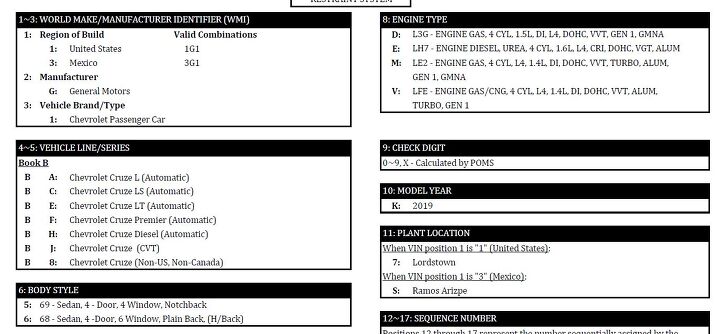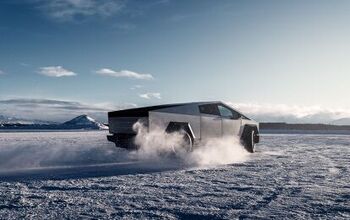Say It Ain't So! Docs Suggest Chevrolet Cruze Losing Manual Transmission

After a year of good news (McDonald’s all-day breakfast came to Canada), it seems only fitting that 2017 will end in tears.
The Chevrolet Cruze, one of a shrinking number of models in which one can easily find a manual transmission, appears set to lose that option after the 2018 model year. As the owner of a manual-shift Cruze, no words can ease the pain.
The glaring product shift appears in General Motors’ 2019 VIN decoder document, posted by the National Highway Traffic Safety Administration late Thursday. As of yet, we haven’t heard back from Chevrolet to confirm the document shows the full range of planned 2019 models.
For buyers of 2018 models, the Cruze offers a six-speed manual transmission on numerous trims — from the L, LS, LT, and Diesel sedan, to the LT and Diesel hatch. That’s a fair bit of stick availability in a world that’s rapidly shedding the third pedal. For 2019, however, the option disappears. Added to the lineup, however, is a continuously variable transmission.
It looks like the row-your-own lifestyle is leaving the Cruze lineup in favor of the efficient, shiftless experience afforded by a CVT, though we don’t know where exactly that tranny will appear. A conventional automatic, assumed to be the existing six-speed unit, continues throughout the Cruze line. (Diesels carry a nine-speed.)
As for powertrains, the model’s second-generation turbocharged 1.4-liter four-cylinder carries over into 2019, as does the 1.6-liter diesel introduced for 2017. What’s new is a CNG version of the 1.4, as well as a 1.5-liter offering. The latter engine is a turbocharged unit that serves as the entry-level engine in the Chevrolet Malibu, making 160 horsepower and 184 lb-ft of torque in that application.
If 2018 is truly the last year for the manual-shift Cruze, its mourners could probably fit in a small bus. Stick-shift take rates in North America hover in the low single-digit range. Still, the Cruze always seemed to lead the U.S. compact pack in the “Save the manuals!” parade. When it debuted back in late 2010, the model’s Eco variant advertised 42 miles per gallon on the highway, all thanks to a long-legged six-speed manual with triple overdrive gearset. A 2018 1.4-liter model with stock six-speed currently rates a 40 mpg highway figure.
The diesel model, however, rates an impressive 52 mpg highway figure when equipped with a six-speed stick. That number drops to 45 mpg when matched with the nine-speed automatic.

More by Steph Willems
Latest Car Reviews
Read moreLatest Product Reviews
Read moreRecent Comments
- Redapple2 Love the wheels
- Redapple2 Good luck to them. They used to make great cars. 510. 240Z, Sentra SE-R. Maxima. Frontier.
- Joe65688619 Under Ghosn they went through the same short-term bottom-line thinking that GM did in the 80s/90s, and they have not recovered say, to their heyday in the 50s and 60s in terms of market share and innovation. Poor design decisions (a CVT in their front-wheel drive "4-Door Sports Car", model overlap in a poorly performing segment (they never needed the Altima AND the Maxima...what they needed was one vehicle with different drivetrain, including hybrid, to compete with the Accord/Camry, and decontenting their vehicles: My 2012 QX56 (I know, not a Nissan, but the same holds for the Armada) had power rear windows in the cargo area that could vent, a glass hatch on the back door that could be opened separate from the whole liftgate (in such a tall vehicle, kinda essential if you have it in a garage and want to load the trunk without having to open the garage door to make room for the lift gate), a nice driver's side folding armrest, and a few other quality-of-life details absent from my 2018 QX80. In a competitive market this attention to detai is can be the differentiator that sell cars. Now they are caught in the middle of the market, competing more with Hyundai and Kia and selling discounted vehicles near the same price points, but losing money on them. They invested also invested a lot in niche platforms. The Leaf was one of the first full EVs, but never really evolved. They misjudged the market - luxury EVs are selling, small budget models not so much. Variable compression engines offering little in terms of real-world power or tech, let a lot of complexity that is leading to higher failure rates. Aside from the Z and GT-R (low volume models), not much forced induction (whether your a fan or not, look at what Honda did with the CR-V and Acura RDX - same chassis, slap a turbo on it, make it nicer inside, and now you can sell it as a semi-premium brand with higher markup). That said, I do believe they retain the technical and engineering capability to do far better. About time management realized they need to make smarter investments and understand their markets better.
- Kwik_Shift_Pro4X Off-road fluff on vehicles that should not be off road needs to die.
- Kwik_Shift_Pro4X Saw this posted on social media; “Just bought a 2023 Tundra with the 14" screen. Let my son borrow it for the afternoon, he connected his phone to listen to his iTunes.The next day my insurance company raised my rates and added my son to my policy. The email said that a private company showed that my son drove the vehicle. He already had his own vehicle that he was insuring.My insurance company demanded he give all his insurance info and some private info for proof. He declined for privacy reasons and my insurance cancelled my policy.These new vehicles with their tech are on condition that we give up our privacy to enter their world. It's not worth it people.”



































Comments
Join the conversation
I really want to jump on the 'new automatics are better - sticks are for dinosaurs' bandwagon. I really do. But then I actually drove them. Does any enthusiast actually enjoy a modern automatic in a 4-banger and think they are better than a stick in real world driving? I mean they are frustrating, often in the wrong gear, often searching, and just a general PITA. I mean, if I were in heavy daily traffic, I'd got with a slushbox, no doubt, as the convenience outweighs the frustration, but from a pleasurable driving experience perspective, I just don't get it, even though I want to.
I find the Cruze automatic works really well, albeit revs up a little high when pressing the pedal moderately. I would have preferred the Cruze to run more stoic at mid acceleration, and rev lower, than rev higher at lean burn.